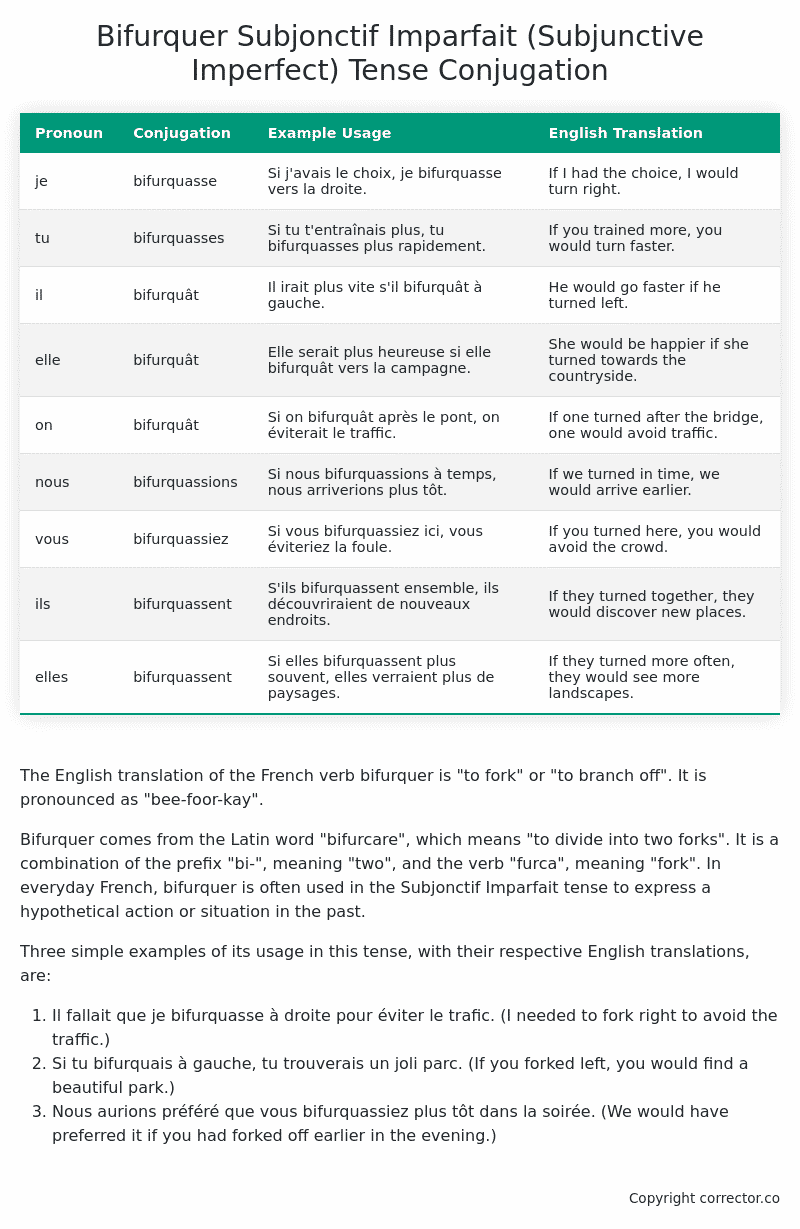Subjonctif Imparfait (Subjunctive Imperfect) Tense Conjugation of the French Verb bifurquer
Introduction to the verb bifurquer
The English translation of the French verb bifurquer is “to fork” or “to branch off”. It is pronounced as “bee-foor-kay”.
Bifurquer comes from the Latin word “bifurcare”, which means “to divide into two forks”. It is a combination of the prefix “bi-“, meaning “two”, and the verb “furca”, meaning “fork”. In everyday French, bifurquer is often used in the Subjonctif Imparfait tense to express a hypothetical action or situation in the past.
Three simple examples of its usage in this tense, with their respective English translations, are:
- Il fallait que je bifurquasse à droite pour éviter le trafic. (I needed to fork right to avoid the traffic.)
- Si tu bifurquais à gauche, tu trouverais un joli parc. (If you forked left, you would find a beautiful park.)
- Nous aurions préféré que vous bifurquassiez plus tôt dans la soirée. (We would have preferred it if you had forked off earlier in the evening.)
Table of the Subjonctif Imparfait (Subjunctive Imperfect) Tense Conjugation of bifurquer
| Pronoun | Conjugation | Example Usage | English Translation |
|---|---|---|---|
| je | bifurquasse | Si j’avais le choix, je bifurquasse vers la droite. | If I had the choice, I would turn right. |
| tu | bifurquasses | Si tu t’entraînais plus, tu bifurquasses plus rapidement. | If you trained more, you would turn faster. |
| il | bifurquât | Il irait plus vite s’il bifurquât à gauche. | He would go faster if he turned left. |
| elle | bifurquât | Elle serait plus heureuse si elle bifurquât vers la campagne. | She would be happier if she turned towards the countryside. |
| on | bifurquât | Si on bifurquât après le pont, on éviterait le traffic. | If one turned after the bridge, one would avoid traffic. |
| nous | bifurquassions | Si nous bifurquassions à temps, nous arriverions plus tôt. | If we turned in time, we would arrive earlier. |
| vous | bifurquassiez | Si vous bifurquassiez ici, vous éviteriez la foule. | If you turned here, you would avoid the crowd. |
| ils | bifurquassent | S’ils bifurquassent ensemble, ils découvriraient de nouveaux endroits. | If they turned together, they would discover new places. |
| elles | bifurquassent | Si elles bifurquassent plus souvent, elles verraient plus de paysages. | If they turned more often, they would see more landscapes. |
Other Conjugations for Bifurquer.
Le Present (Present Tense) Conjugation of the French Verb bifurquer
Imparfait (Imperfect) Tense Conjugation of the French Verb bifurquer
Passé Simple (Simple Past) Tense Conjugation of the French Verb bifurquer
Passé Composé (Present Perfect) Tense Conjugation of the French Verb bifurquer
Futur Simple (Simple Future) Tense Conjugation of the French Verb bifurquer
Futur Proche (Near Future) Tense Conjugation of the French Verb bifurquer
Plus-que-parfait (Pluperfect) Tense Conjugation of the French Verb bifurquer
Passé Antérieur (Past Anterior) Tense Conjugation of the French Verb bifurquer
Futur Antérieur (Future Anterior) Tense Conjugation of the French Verb bifurquer
Subjonctif Présent (Subjunctive Present) Tense Conjugation of the French Verb bifurquer
Subjonctif Passé (Subjunctive Past) Tense Conjugation of the French Verb bifurquer
Subjonctif Imparfait (Subjunctive Imperfect) Tense Conjugation of the French Verb bifurquer (this article)
Subjonctif Plus-que-parfait (Subjunctive Pluperfect) Tense Conjugation of the French Verb bifurquer
Conditionnel Présent (Conditional Present) Tense Conjugation of the French Verb bifurquer
Conditionnel Passé (Conditional Past) Tense Conjugation of the French Verb bifurquer
L’impératif Présent (Imperative Present) Tense Conjugation of the French Verb bifurquer
L’infinitif Présent (Infinitive Present) Tense Conjugation of the French Verb bifurquer
Struggling with French verbs or the language in general? Why not use our free French Grammar Checker – no registration required!
Get a FREE Download Study Sheet of this Conjugation 🔥
Simply right click the image below, click “save image” and get your free reference for the bifurquer Subjonctif Imparfait tense conjugation!

Bifurquer – About the French Subjonctif Imparfait (Subjunctive Imperfect) Tense
Formation
Common Everyday Usage Patterns
Interactions with Other Tenses
Subjonctif Présent
Indicatif Passé Composé
Conditional
Conditional Perfect
Summary
I hope you enjoyed this article on the verb bifurquer. Still in a learning mood? Check out another TOTALLY random French verb conjugation!


